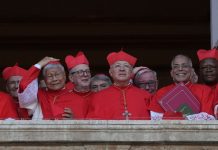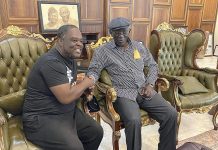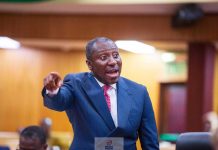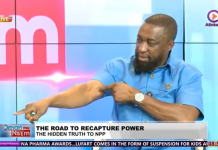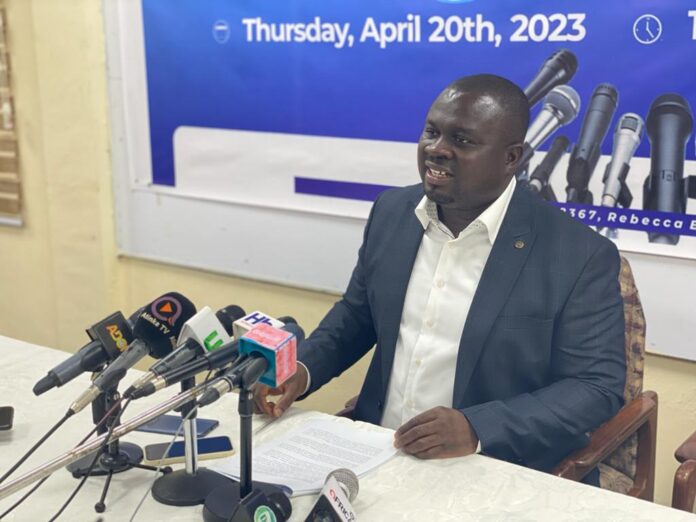The Ghana Journalists Association (GJA), Media Foundation for West Africa (MFWA), Ghana Independent Broadcasters Association (GIBA), and the Private Newspaper Publishers Association (PRINPAG) have called on the Government to repeal the Electronic Communications Act 2008 and the Criminal and Other Offences Act, 1960 with immediate effect.
The Repeal of the two laws, the GJA, MFWA, GIBA and PRINPAG believe will enable press freedom and allow the media to operate without attacks from citizens and the police or security agencies.
The Four organisations made the request at a joint press conference held in Accra on Thursday, April 20,2023 at the International Press centre.
The Joint Press conference was held as a result of how journalists are treated by the Police or security agencies, even citizens when they are at fault.
A typical case is that of Noah Nartey Dameh of Radio Ada who was arrested and mishandled on false publication charges in connection with a critical Facebook post.
Addressing the joint press conference on behalf of GJA, MFWA, GIBA and PRINPAG, the President of the Ghana Journalists Association, Mr Albert Kwabena Dwumfour said Since the beginning of 2022, a number of journalists and one civil society activist have been prosecuted in Ghana using the Electronic Communications Act and the Criminal Code, specifically Section 208 of the Criminal and Other Offences Act, 1960 (Act 29).
He said in one incident, the police arrested Kwabena BobieAnsah, a presenter with Accra FM, on February 10, 2022 and charged him with publishing “false news and offensive conduct.”, adding that the police detained the journalist, who had alleged that First Lady Rebecca Akufo-Addo had illegally acquired state land for private use.
According to Mr Dwumfour, as key stakeholders in the media sector, the GJA, MFWA, GIBA, PRINPAG and GCRN were equally concerned about the use of the Electronic Communications Act as well as the Criminal and Other Offences Act to arrest citizens and journalists and prefer criminal charges against them for press and speech offences which are merely defamatory and for which civil remedies are available.
He said Section 76 of the Electronic Communications Act, 2008 (Act 775) states: “A person who by means of electronic communications service, knowingly sends a communication which is false or misleading and likely to prejudice the efficiency of life-saving service or to endanger the safety of any person, ship, aircraft, vessel or vehicle commits an offence and is liable on summary conviction to a fine of not more than three thousand penalty units or to a term of imprisonment of not more than five years or both.”
Similarly, He noted that section 208 of the Criminal and Other Offences Act, 1960 (Act 29) also provides: “A person who publishes or reproduces a statement, rumour or report which is likely to cause fear and alarm to the public or to disturb the public peace knowing or having reason to believe that the statement, rumour or report is false commits a misdemeanour.”
Meanwhile, the GJA President said the four institutions find it ironic that a Government, presided by Nana Akufo-Addo, who is much vaunted as a human rights and press freedom champion, is supervising the surreptitious reintroduction of criminal libel through the use of the above-mentioned criminal laws.
He said indeed, the repression of freedom of expression using the law on false publication likely to cause fear and panic undercuts the publicly expressed view of President Akufo-Addo.
Mr Dwumfour recalled that speaking on the topic “Outlawing Criminal Libel Laws” during a conference at the University of Pretoria in August 2011, Nana Akufo-Addo lamented that such laws are susceptible to broad and abusive interpretation.
“…the problem with our current false news law is that it is more directed at mere expression and the state of mind, namely fear and alarm, which in the best of worlds is difficult to determine,” Mr Dwumfour quoted the then Presidential Candidate.
He quizzed that, “In the face of the increasing use of this law to target critical journalists under President Akufo-Addo’s regime, we may well ask the question, “What has changed?”.
The GJA President admitted that the media and journalists can sometimes be reckless and unprofessional to the extent of publishing false and defamatory stories, adding that fortunately, the laws of the country provide aggrieved entities with remedies for civil actions against citizens, journalists and media organisations.
“It is regrettable therefore, that repressive sections of the Electronic Communications Act and the Criminal and Other Offences Act, 1960 (Act 29) are being weaponized to muzzle free speech under the Akufo-Addo regime,” he stated.
He stressed that, “It may be argued that the arrests and persecutions have been in accordance with the law. It is equally true that the victims of the ex-while criminal libel law were also dealt with in line with the law. Indeed, many of the world’s intolerant and autocratic governments typically deal with dissent and press offenses by exploiting the law, hence our call for a repeal of the two laws.”
Mr Dwumfour again noted that it is largely due to the wanton arrest and detention of journalists that Ghana plummeted from its lofty perch as the country with the freest media environment in Africa in 2018 to 30th in the 2022 global press freedom ranking by Reporters without Borders (RSF).
He said on the global stage also, Ghana dropped from 30th position in 2021 to 60th in 2022, the worst ranking in 20 years.
“The violations that have been recorded in Ghana over the past year give course for pessimism regarding the country’s performance in the next ranking. It is obvious that our press freedom environment is deteriorating and that the abuse of the two controversial laws has contributed massively to the deterioration.
It is our view therefore that efforts to bring a positive change should begin with a reconsideration of those laws,” he said.
The GJA President also called on the government to adequately resource the National Media Commission to effectively carry out its mandate of monitoring and regulating media content in a proactive manner.
“This, we believe, will discourage police involvement in the media regulatory space,” he said.
Ghana| Atinkaonline.com| Porcia Oofriwaa Ofori






